人教版七年级英语下册Units11-12 知识点汇总 +练习(含解析)
文档属性
| 名称 | 人教版七年级英语下册Units11-12 知识点汇总 +练习(含解析) |
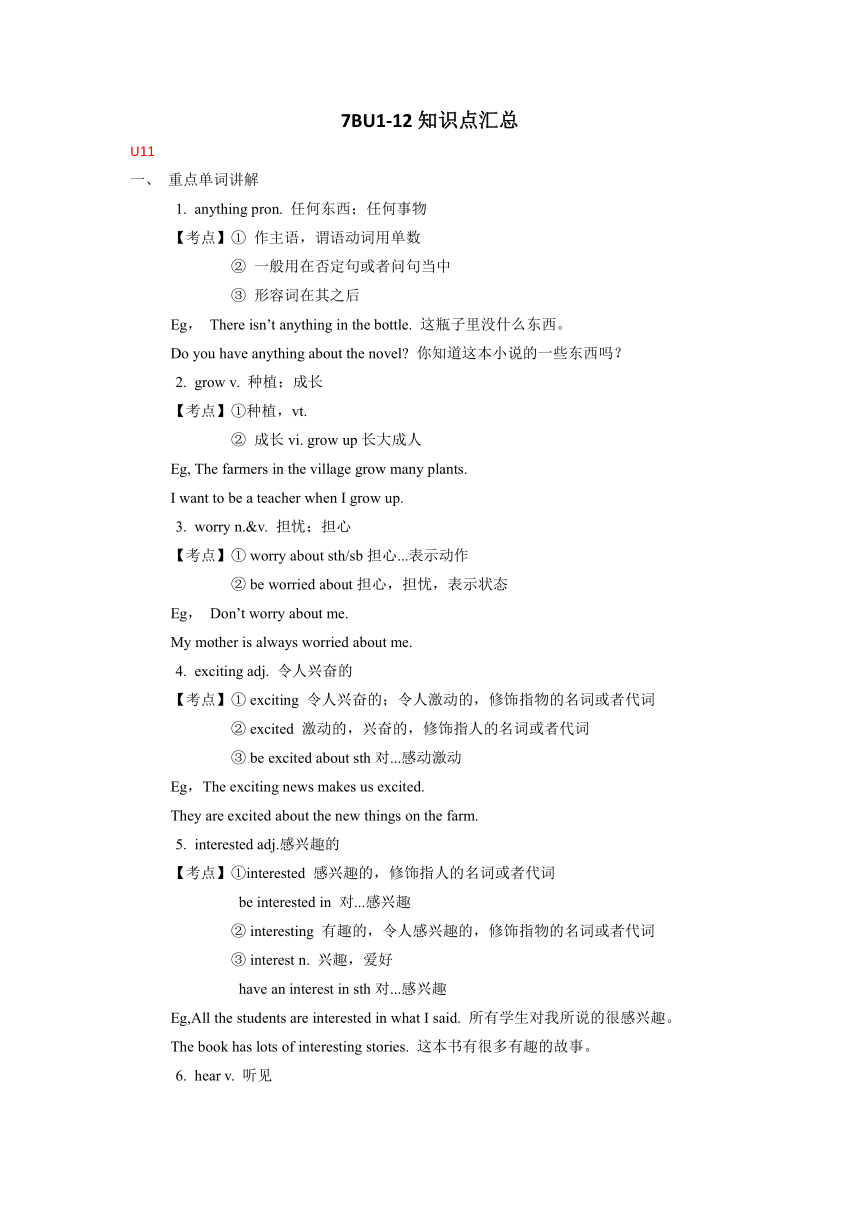
|
|
| 格式 | docx | ||
| 文件大小 | 63.5KB | ||
| 资源类型 | 教案 | ||
| 版本资源 | 人教新目标(Go for it)版 | ||
| 科目 | 英语 | ||
| 更新时间 | 2024-05-14 06:33:19 | ||
图片预览

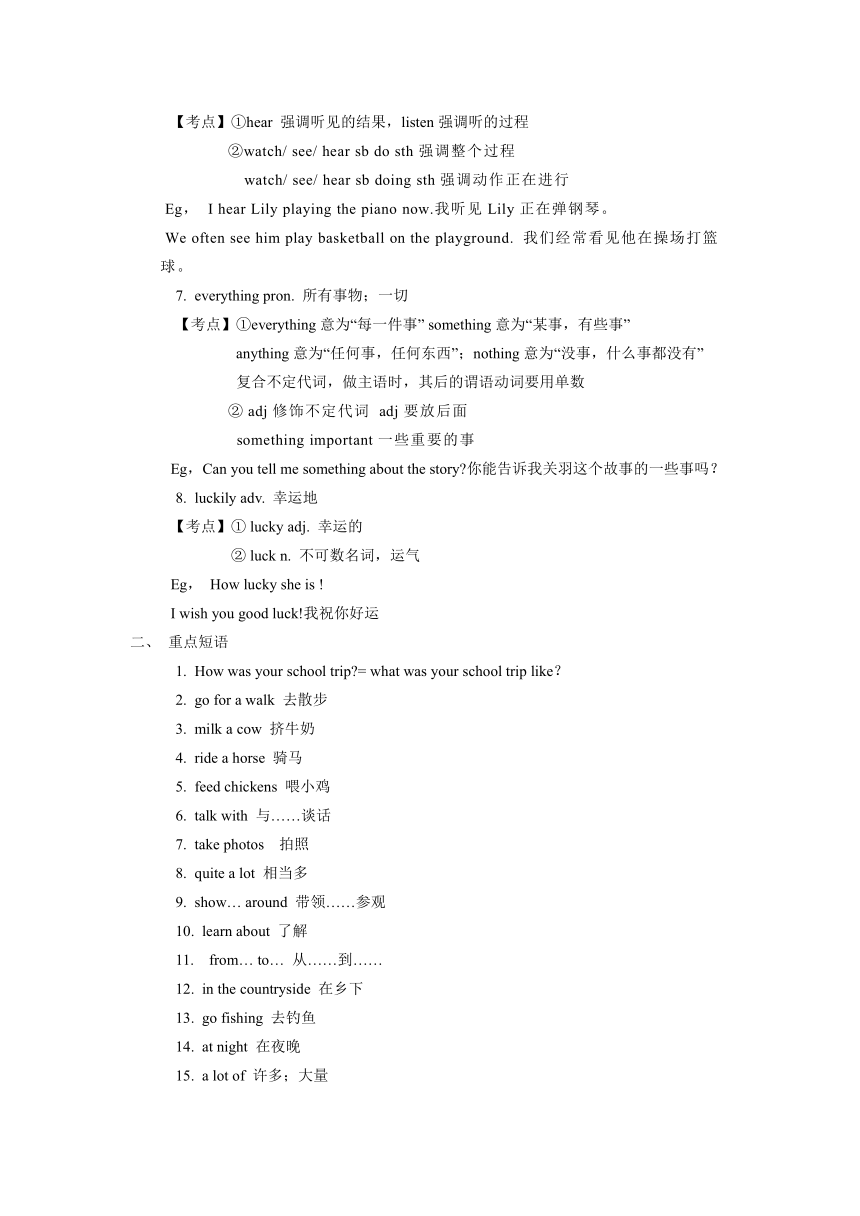
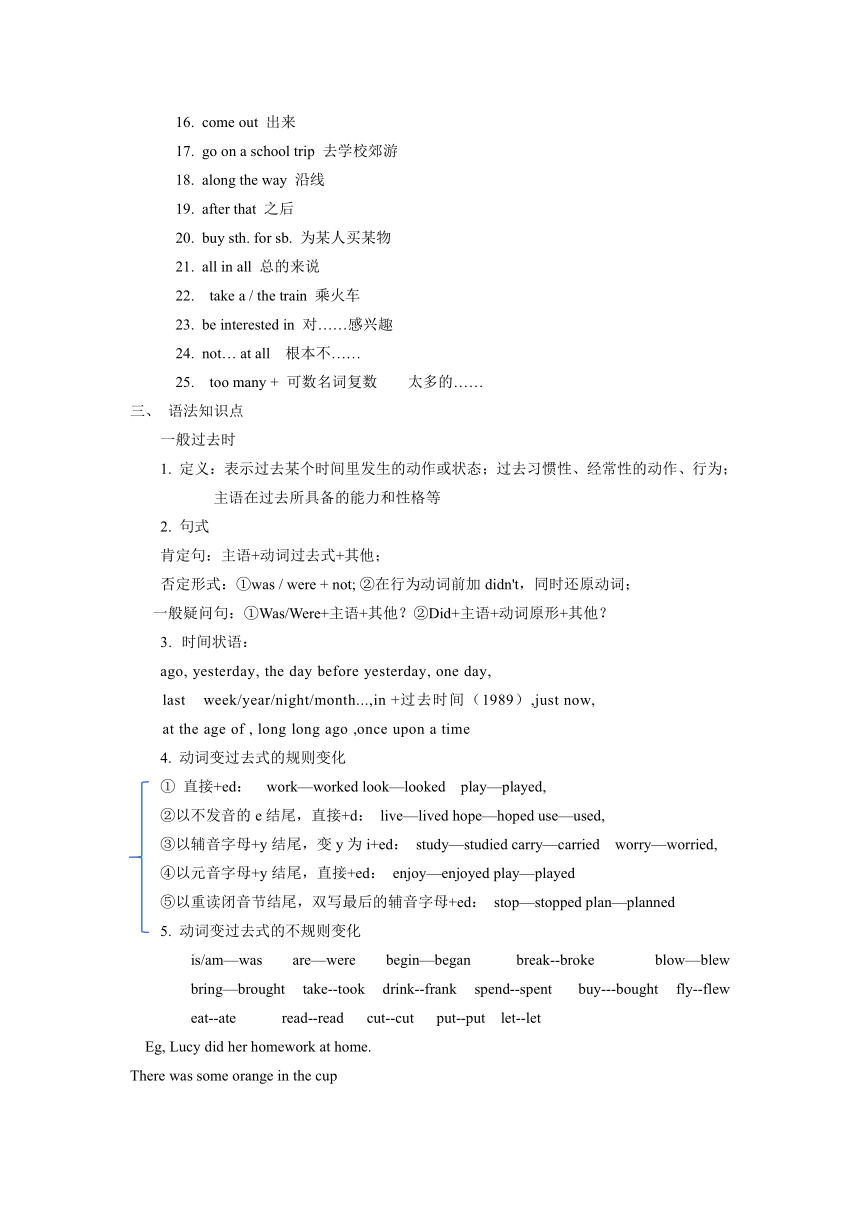
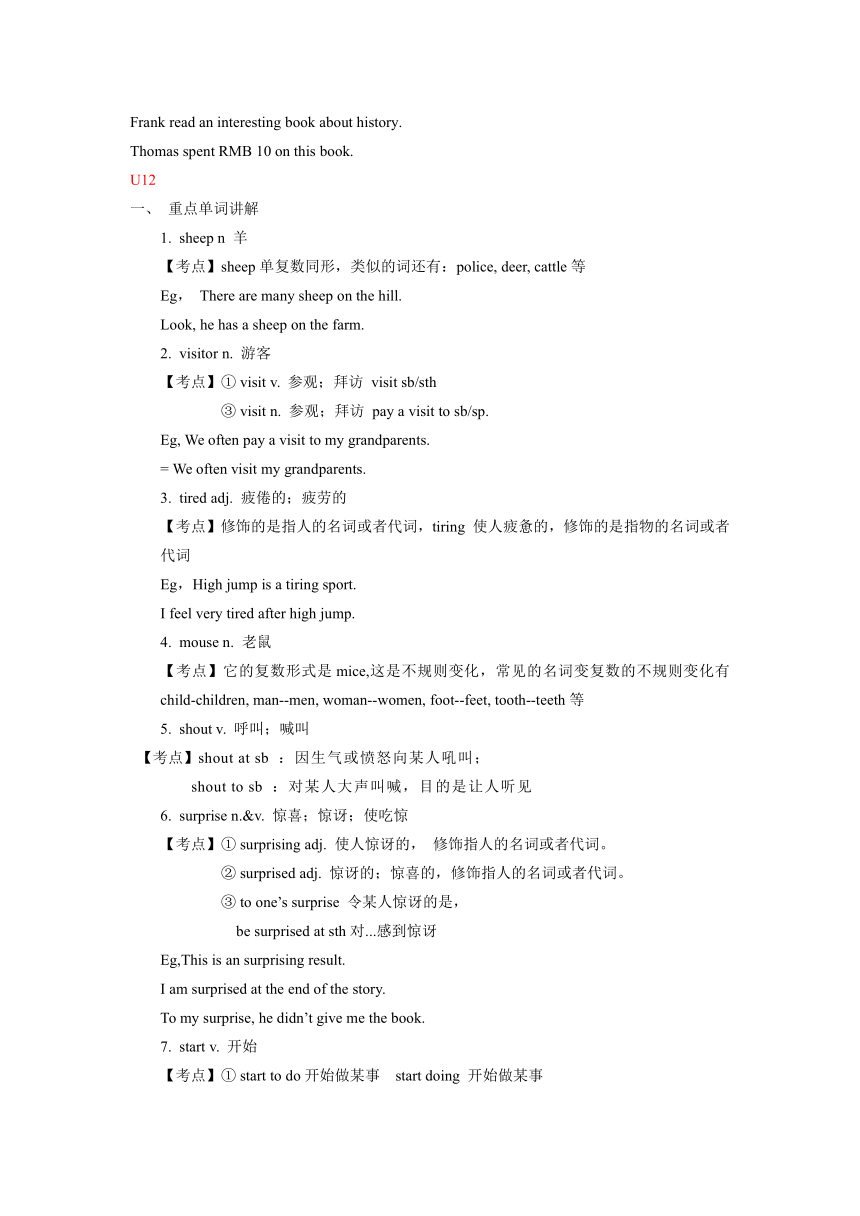
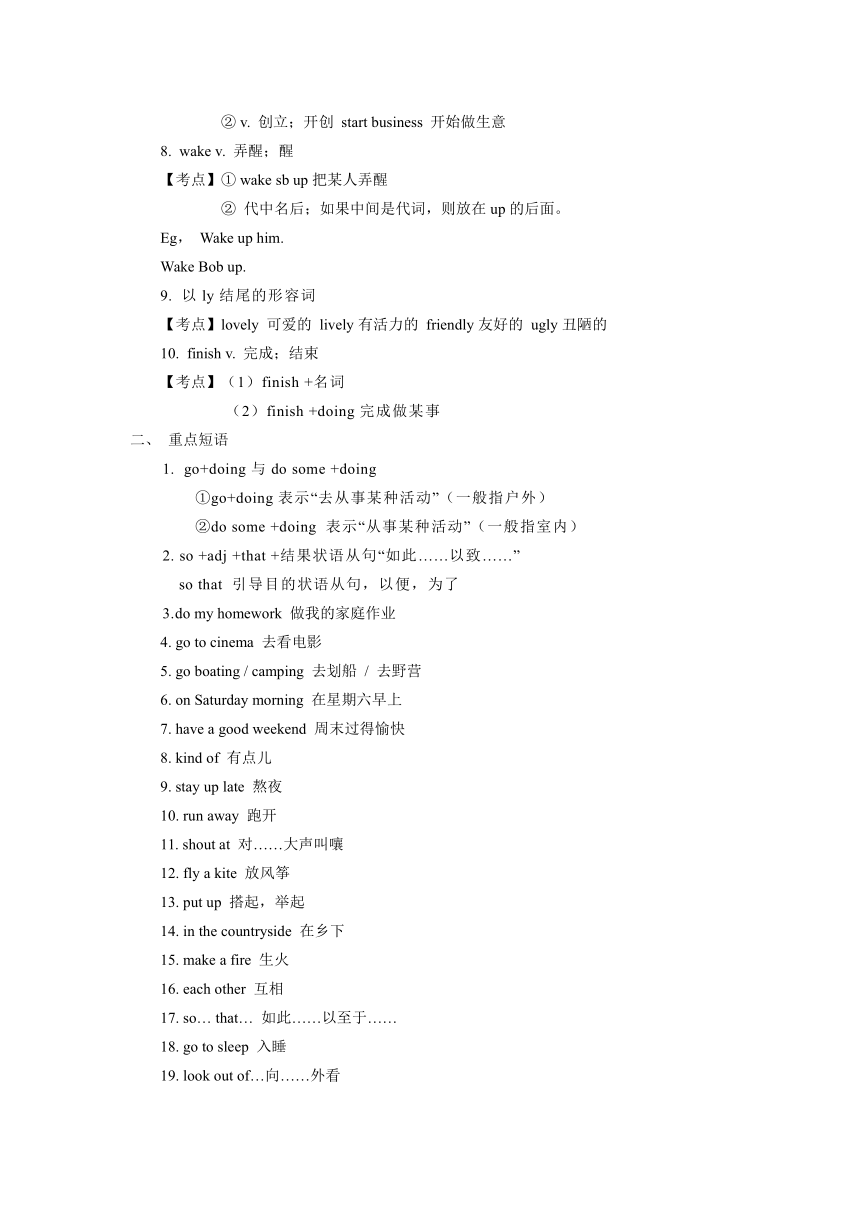
文档简介
7BU1-12知识点汇总
U11
重点单词讲解
anything pron. 任何东西;任何事物
【考点】① 作主语,谓语动词用单数
② 一般用在否定句或者问句当中
③ 形容词在其之后
Eg, There isn’t anything in the bottle. 这瓶子里没什么东西。
Do you have anything about the novel 你知道这本小说的一些东西吗?
grow v. 种植;成长
【考点】①种植,vt.
② 成长vi. grow up长大成人
Eg, The farmers in the village grow many plants.
I want to be a teacher when I grow up.
worry n.&v. 担忧;担心
【考点】① worry about sth/sb担心...表示动作
② be worried about担心,担忧,表示状态
Eg, Don’t worry about me.
My mother is always worried about me.
exciting adj. 令人兴奋的
【考点】① exciting 令人兴奋的;令人激动的,修饰指物的名词或者代词
② excited 激动的,兴奋的,修饰指人的名词或者代词
③ be excited about sth对...感动激动
Eg,The exciting news makes us excited.
They are excited about the new things on the farm.
interested adj.感兴趣的
【考点】①interested 感兴趣的,修饰指人的名词或者代词
be interested in 对...感兴趣
② interesting 有趣的,令人感兴趣的,修饰指物的名词或者代词
③ interest n. 兴趣,爱好
have an interest in sth对...感兴趣
Eg,All the students are interested in what I said. 所有学生对我所说的很感兴趣。
The book has lots of interesting stories. 这本书有很多有趣的故事。
hear v. 听见
【考点】①hear 强调听见的结果,listen强调听的过程
②watch/ see/ hear sb do sth强调整个过程
watch/ see/ hear sb doing sth强调动作正在进行
Eg, I hear Lily playing the piano now.我听见Lily正在弹钢琴。
We often see him play basketball on the playground. 我们经常看见他在操场打篮球。
everything pron. 所有事物;一切
【考点】①everything意为“每一件事” something意为“某事,有些事”
anything意为“任何事,任何东西”;nothing意为“没事,什么事都没有”
复合不定代词,做主语时,其后的谓语动词要用单数
② adj修饰不定代词 adj要放后面
something important一些重要的事
Eg,Can you tell me something about the story 你能告诉我关羽这个故事的一些事吗?
luckily adv. 幸运地
【考点】① lucky adj. 幸运的
② luck n. 不可数名词,运气
Eg, How lucky she is !
I wish you good luck!我祝你好运
重点短语
How was your school trip = what was your school trip like?
go for a walk 去散步
milk a cow 挤牛奶
ride a horse 骑马
feed chickens 喂小鸡
talk with 与……谈话
take photos 拍照
quite a lot 相当多
show… around 带领……参观
learn about 了解
from… to… 从……到……
in the countryside 在乡下
go fishing 去钓鱼
at night 在夜晚
a lot of 许多;大量
come out 出来
go on a school trip 去学校郊游
along the way 沿线
after that 之后
buy sth. for sb. 为某人买某物
all in all 总的来说
take a / the train 乘火车
be interested in 对……感兴趣
not… at all 根本不……
too many + 可数名词复数 太多的……
语法知识点
一般过去时
定义:表示过去某个时间里发生的动作或状态;过去习惯性、经常性的动作、行为;
主语在过去所具备的能力和性格等
句式
肯定句:主语+动词过去式+其他;
否定形式:①was / were + not; ②在行为动词前加didn't,同时还原动词;
一般疑问句:①Was/Were+主语+其他?②Did+主语+动词原形+其他?
时间状语:
ago, yesterday, the day before yesterday, one day,
last week/year/night/month...,in +过去时间(1989),just now,
at the age of , long long ago ,once upon a time
动词变过去式的规则变化
① 直接+ed: work—worked look—looked play—played,
②以不发音的e结尾,直接+d: live—lived hope—hoped use—used,
③以辅音字母+y结尾,变y为i+ed: study—studied carry—carried worry—worried,
④以元音字母+y结尾,直接+ed: enjoy—enjoyed play—played
⑤以重读闭音节结尾,双写最后的辅音字母+ed: stop—stopped plan—planned
动词变过去式的不规则变化
is/am—was are—were begin—began break--broke blow—blew bring—brought take--took drink--frank spend--spent buy---bought fly--flew eat--ate read--read cut--cut put--put let--let
Eg, Lucy did her homework at home.
There was some orange in the cup
Frank read an interesting book about history.
Thomas spent RMB 10 on this book.
U12
重点单词讲解
sheep n 羊
【考点】sheep单复数同形,类似的词还有:police, deer, cattle等
Eg, There are many sheep on the hill.
Look, he has a sheep on the farm.
visitor n. 游客
【考点】① visit v. 参观;拜访 visit sb/sth
③ visit n. 参观;拜访 pay a visit to sb/sp.
Eg, We often pay a visit to my grandparents.
= We often visit my grandparents.
tired adj. 疲倦的;疲劳的
【考点】修饰的是指人的名词或者代词,tiring 使人疲惫的,修饰的是指物的名词或者代词
Eg,High jump is a tiring sport.
I feel very tired after high jump.
mouse n. 老鼠
【考点】它的复数形式是mice,这是不规则变化,常见的名词变复数的不规则变化有child-children, man--men, woman--women, foot--feet, tooth--teeth等
shout v. 呼叫;喊叫
【考点】shout at sb :因生气或愤怒向某人吼叫;
shout to sb :对某人大声叫喊,目的是让人听见
surprise n.&v. 惊喜;惊讶;使吃惊
【考点】① surprising adj. 使人惊讶的, 修饰指人的名词或者代词。
② surprised adj. 惊讶的;惊喜的,修饰指人的名词或者代词。
③ to one’s surprise 令某人惊讶的是,
be surprised at sth对...感到惊讶
Eg,This is an surprising result.
I am surprised at the end of the story.
To my surprise, he didn’t give me the book.
start v. 开始
【考点】① start to do开始做某事 start doing 开始做某事
② v. 创立;开创 start business 开始做生意
wake v. 弄醒;醒
【考点】① wake sb up把某人弄醒
② 代中名后;如果中间是代词,则放在up的后面。
Eg, Wake up him.
Wake Bob up.
以ly结尾的形容词
【考点】lovely 可爱的 lively有活力的 friendly友好的 ugly丑陋的
finish v. 完成;结束
【考点】(1)finish +名词
(2)finish +doing完成做某事
重点短语
go+doing与do some +doing
①go+doing表示“去从事某种活动”(一般指户外)
②do some +doing 表示“从事某种活动”(一般指室内)
2. so +adj +that +结果状语从句“如此……以致……”
so that 引导目的状语从句,以便,为了
3.do my homework 做我的家庭作业
4. go to cinema 去看电影
5. go boating / camping 去划船 / 去野营
6. on Saturday morning 在星期六早上
7. have a good weekend 周末过得愉快
8. kind of 有点儿
9. stay up late 熬夜
10. run away 跑开
11. shout at 对……大声叫嚷
12. fly a kite 放风筝
13. put up 搭起,举起
14. in the countryside 在乡下
15. make a fire 生火
16. each other 互相
17. so… that… 如此……以至于……
18. go to sleep 入睡
19. look out of…向……外看
20. shout to 冲……呼喊
21. up and down 上上下下
22. wake…up 把……弄醒
23. move into… 移进……
24. keep + sb. / sth. + 形容词 / 副词 / 介词短语 使……保持……
25. see sb. doing sth. 看见某人正在做某事
26. let sb. do sth. 让某人做某事
27. start to do / doing sth. 开始做某事
语法知识点
感叹句结构
How+ adj./adv.+(主语+谓语)!
How +主语+谓语!
How + adj. +a/an+名词单数+(主语+谓语)!
Eg, How lucky you are!
How I want to play with you!
How cute a girl she is!
It is +adj. +to do sth.it充当形式主语。
It在句中不仅可以充当形式主语,还可以充当形式宾语,常用结构如下:
主语+find/think/believe+ 宾语+adj.+to do sth 觉得/认为做某事是怎么样的。
Eg,It is good to do morning exercise every day.
We all think it exciting to have a picnic in the countryside.
同步练习
一、听力(共15小题;每小题1分, 满分15分)
二、单项填空(共 10小题;每小题1分, 满分10分)
1. From this notice in the zoo, we can learn ________.
A. how to feed the donkeys B. how to play with the donkeys
C. why the donkeys are on a special diet D. why we should keep away from the donkeys
【答案】D
【解析】
【详解】句意:从动物园的这个告示中,我们可以知道为什么我们应该远离驴。
考查常识。how to feed the donkeys怎么喂驴;how to play with the donkeys怎么和驴玩;why the donkeys are on a special diet为什么驴要吃特殊的食物;why we should keep away from the donkeys为什么我们要远离驴。根据“PLEASE KEEP OUT”和“THEY BITE AND KICK”可知,驴会咬人和踢人,所以我们应该要远离驴。故选D。
2. My pet dog often ________ me into the kitchen and wants to get some food.
A. follows B. wakes C. calls D. carries
【答案】A
【解析】
【详解】句意:我的宠物狗经常跟着我进厨房,想得到一些食物。
考查动词辨析。follows跟随;wakes醒;calls叫,打电话;carries携带。根据“My pet dog often ... me into the kitchen”可知,宠物狗是跟着我进厨房。故选A。
3. —Sir, drive your car away. Look at the ________. It says “No Parking”.
—Sorry, I didn’t see it.
A. picture B. sign C. information D. card
【答案】B
【解析】
【详解】句意:——先生,把你的车开走,看牌子,上面写着“不要停车”。——抱歉,我没有看到。
考查名词辨析。picture图片;sign标志;information信息;card卡片。根据“No Parking”可知此处表达牌子上写着不要停车。故选B。
4. —Lily has a Bing Dwen Dwen. It’s different from ________. It’s a golden one.
—Really I hope I can have one.
A. me B. mine C. you D. your
【答案】B
【解析】
【详解】句意:——莉莉有一个冰墩墩。它与我的不同。这是一个金色的。——真的吗?我希望我能有一个。
考查代词辨析。me我,宾格;mine我的,名词性物主代词;you你,主格,宾格;your你的,形容词性物主代词。根据“It’s different from...”可知表示与……不同,应用物主代词,空格后没有名词,需用名词性物主代词。故选B。
5. Read the following words. Which word has the same stress as “station”
A. invite B. machine C. hometown D. below
【答案】C
【解析】
【详解】句意:读下面的单词。哪个单词的重音和“station”一样?
考查重音。invite/ n va t/;machine/m i n/;hometown/ h mta n/;below/b l /。根据重音分析可知,hometown的重音与station的重音相同,都在第一音节。故选C。
6. —You don’t always ________ grammar while speaking.
—Thank you. I’ll practice more.
A. learn about B. know about C. worry about D. talk about
【答案】C
【解析】
【详解】句意:——说话时你不必总是担心语法问题。——谢谢你!我会多练习。
考查动词短语。learn about获悉,得知;know about知道,了解;worry about担心;talk about谈论。根据“You don’t always...grammar while speaking.”和选项可知,此处指说话时不必总是担心语法问题。故选C。
7 —Children can have free time to do sports after school.
—That’s good. I hope they ________ sports part of their life in the future.
A. will make B. are making C. will do D. are doing
【答案】A
【解析】
【详解】句意:——孩子们放学后可以有空闲时间做运动。——那很好。我希望他们将来能把运动作为生活的一部分。
考查动词时态及动词辨析。根据“in the future”可知,此处的时态为一般将来时:will+动词原形;make使变得;do做,由“they ... sports part of their life”可知,此处表示把运动作为他们生活的一部分,动词用make。故选A。
8. —Dad, my computer doesn’t work. Is there ________ with it
—Don’t worry. I’ll check it. You won’t miss your online English lesson.
A. wrong something B. wrong anything C. something wrong D. anything wrong
【答案】D
【解析】
【详解】句意:——爸爸,我的电脑坏了,它有什么问题吗?——不要担心。我检查一下。你不要错过你的线上英语课。
考查复合不定代词。antthing任何东西,用于否定句或疑问句中;something某样东西,用于肯定句中。根据“Is there …with it”可知此处是一般疑问句,应用anything;形容词修饰复合不定代词时,放在不定代词后面。故选D。
9. —Did you see Gu Ailing’s last jump on TV
—Yes, that’s so ________, but she did it.
A. cool B. famous C. wonderful D. difficult
【答案】D
【解析】
【详解】句意:——你在电视上看到谷爱凌的最后一跳了吗?——是的,这太难了,但她做到了。
考查形容词辨析。cool凉爽的;famous著名的;wonderful精彩的;difficult困难的。根据“but she did it.”可知表示但是她做到了,由but可知表示转折,因此是困难的,符合题意。故选D。
10. —Mike, be careful and look both ways before you cross the street.
—________. Thank you, mum.
A. OK, I will B. I see C. Sounds good D. I hope so
【答案】A
【解析】
【详解】句意:——迈克,过马路前要小心,向两边看。——好的,我会的。谢谢你,妈妈。
考查情景交际。OK, I will好的,我会的;I see我明白了;Sounds good听起来不错;I hope so但愿如此。根据“be careful and look both ways before you cross the street.”和“Thank you, mum.”可知,此处“OK, I will”符合语境,表示同意妈妈的话。故选A。
三、完形填空(共10 小题;每小题1分, 满分10分)
请认真阅读下列短文, 从短文后各题所给 A、B、C、D的四个选项中, 选出最佳选项, 并在答题卡上将该项涂黑。
David is tying(系)his running shoes for the third time. These days he is always talking about his first running race. He hopes he will ___11___ in his age group.
The starter(发令员)calls everyone to the starting line. David walks to Benny. “Don’t go out too fast and you’ll be ___12___. It doesn’t matter what place(名次)you finish in. The run is for a good cause.” The school is getting money for a ___13___, because he lost his house in a hurricane(飓风). “Right. Let’s do this for Mr. Martin.” Benny said.
“Thanks for getting so ___14___ of your classmates to come out today, David,” Mr. Martin says. “The place is not important, you’re a winner(获胜者)in my heart.”
The race begins. After the first mile, David ___15___ and sees Benny running after him. Mr. Martin is still next to David.
“We’re all winners, right ” David ___16___ Mr. Martin. Mr. Martin looks back at Benny and a few other students. “Every one of you.”
David nods and runs back to Benny and the others. “Arms up ___17___ your heads and take long slow breaths(呼吸),” David says. His friends ___18___ and do like that.
“Good. Now swing(摆动)your arms again and take long slow breaths.” David goes on ___19___ his friends until he sees the finishing line. “There’s the e on, everyone. Let’s finish this together.”
They cross the finishing line as a ___20___and find Mr. Martin waiting for them. “Why do you come back for us, David ” Benny asks, still out of breath. “You can win.”
“We’re all winners,”. David says, smiling at Mr. Martin.
11. A. come first B. go out C. have fun D. keep fit
12. A. sick B. fine C. weak D. lucky
13. A. boy B. girl C. student D. teacher
14. A. much B. many C. little D. few
15. A. looks up B. looks down C. looks back D. looks around
16. A. answers B. tells C. calls D. asks
17. A. under B. around C. over D. on
18. A. listen B. jump C. shout D. laugh
19. A. helping B. taking C. cheering D. teaching
20. A. school B. class C. group D. club
【答案】11. A 12. B 13. D 14. B 15. C 16. D 17. B 18. A 19. A 20. C
【解析】
【导语】本文讲述了一次为了给飓风中失去家的老师筹钱而组织的赛跑比赛的故事。
【11题详解】
句意:他希望他能在他的年龄组得第一。
come first得第一;go out出去;have fun玩得开心;keep fit保持健康。根据“first running race”可知,比赛是想得第一。故选A。
【12题详解】
句意:不要出去太快,你没问题的。
sick生病的;fine好;weak虚弱的;lucky幸运的。根据“It doesn’t matter what place(名次)you finish in. The run is for a good cause.”可知,此处是David对Benny的鼓励,表示对方会没问题的。故选B。
【13题详解】
句意:学校正在为一名老师筹钱。
boy男孩;girl女孩;student学生;teacher老师。根据“Let’s do this for Mr. Martin.”可知,是为老师筹钱。故选D。
【14题详解】
句意:谢谢你今天邀请这么多同学来,David。
much很多,修饰不可数名词;many很多,修饰可数名词复数;little很少,修饰不可数跟名词;few几乎没有,修饰可数名词复数。根据“classmates”以及“a few other students”可知,是修饰可数名词复数,且是很多同学来参加。故选B。
【15题详解】
句意:一英里过后,David回头看见Benny在他后面跑。
looks up查看;looks down向下看;looks back回头看;looks around四处看。根据“running after him”可知,看后面跑步的人要回头看。故选C。
【16题详解】
句意:David问Martin先生。
answers回答;tells告诉;calls打电话;asks问。根据“We’re all winners, right ”可知,是问句,因此是询问。故选D。
【17题详解】
句意:双手环抱头部,做长时间的缓慢呼吸。
under在……下面;around在……周围;;over在……上面;on在……上。根据“Arms up…your heads and take long slow breaths”可知,这是David在教跑步方法,应该双手环抱头部。故选B。
【18题详解】
句意:他的朋友听到了并且像那样做了。
listen听;jump跳;shout大喊;laugh大笑。根据“do like that”可知,是听到之后做了同样的动作。故选A。
【19题详解】
句意:David继续帮助他的朋友们直到他看到了终点线。
helping帮助;taking拿;cheering欢呼;teaching教。根据“Now swing(摆动)your arms again and take long slow breaths.”可知,David在帮助他的朋友们跑步。故选A。
【20题详解】
句意:他们一起跨过终点线,发现Martin先生在等着他们。
school学校;class班级;group组;club俱乐部。根据“ in his age group”可知,此处他们一个组一起冲过终点线。故选C。
U11
重点单词讲解
anything pron. 任何东西;任何事物
【考点】① 作主语,谓语动词用单数
② 一般用在否定句或者问句当中
③ 形容词在其之后
Eg, There isn’t anything in the bottle. 这瓶子里没什么东西。
Do you have anything about the novel 你知道这本小说的一些东西吗?
grow v. 种植;成长
【考点】①种植,vt.
② 成长vi. grow up长大成人
Eg, The farmers in the village grow many plants.
I want to be a teacher when I grow up.
worry n.&v. 担忧;担心
【考点】① worry about sth/sb担心...表示动作
② be worried about担心,担忧,表示状态
Eg, Don’t worry about me.
My mother is always worried about me.
exciting adj. 令人兴奋的
【考点】① exciting 令人兴奋的;令人激动的,修饰指物的名词或者代词
② excited 激动的,兴奋的,修饰指人的名词或者代词
③ be excited about sth对...感动激动
Eg,The exciting news makes us excited.
They are excited about the new things on the farm.
interested adj.感兴趣的
【考点】①interested 感兴趣的,修饰指人的名词或者代词
be interested in 对...感兴趣
② interesting 有趣的,令人感兴趣的,修饰指物的名词或者代词
③ interest n. 兴趣,爱好
have an interest in sth对...感兴趣
Eg,All the students are interested in what I said. 所有学生对我所说的很感兴趣。
The book has lots of interesting stories. 这本书有很多有趣的故事。
hear v. 听见
【考点】①hear 强调听见的结果,listen强调听的过程
②watch/ see/ hear sb do sth强调整个过程
watch/ see/ hear sb doing sth强调动作正在进行
Eg, I hear Lily playing the piano now.我听见Lily正在弹钢琴。
We often see him play basketball on the playground. 我们经常看见他在操场打篮球。
everything pron. 所有事物;一切
【考点】①everything意为“每一件事” something意为“某事,有些事”
anything意为“任何事,任何东西”;nothing意为“没事,什么事都没有”
复合不定代词,做主语时,其后的谓语动词要用单数
② adj修饰不定代词 adj要放后面
something important一些重要的事
Eg,Can you tell me something about the story 你能告诉我关羽这个故事的一些事吗?
luckily adv. 幸运地
【考点】① lucky adj. 幸运的
② luck n. 不可数名词,运气
Eg, How lucky she is !
I wish you good luck!我祝你好运
重点短语
How was your school trip = what was your school trip like?
go for a walk 去散步
milk a cow 挤牛奶
ride a horse 骑马
feed chickens 喂小鸡
talk with 与……谈话
take photos 拍照
quite a lot 相当多
show… around 带领……参观
learn about 了解
from… to… 从……到……
in the countryside 在乡下
go fishing 去钓鱼
at night 在夜晚
a lot of 许多;大量
come out 出来
go on a school trip 去学校郊游
along the way 沿线
after that 之后
buy sth. for sb. 为某人买某物
all in all 总的来说
take a / the train 乘火车
be interested in 对……感兴趣
not… at all 根本不……
too many + 可数名词复数 太多的……
语法知识点
一般过去时
定义:表示过去某个时间里发生的动作或状态;过去习惯性、经常性的动作、行为;
主语在过去所具备的能力和性格等
句式
肯定句:主语+动词过去式+其他;
否定形式:①was / were + not; ②在行为动词前加didn't,同时还原动词;
一般疑问句:①Was/Were+主语+其他?②Did+主语+动词原形+其他?
时间状语:
ago, yesterday, the day before yesterday, one day,
last week/year/night/month...,in +过去时间(1989),just now,
at the age of , long long ago ,once upon a time
动词变过去式的规则变化
① 直接+ed: work—worked look—looked play—played,
②以不发音的e结尾,直接+d: live—lived hope—hoped use—used,
③以辅音字母+y结尾,变y为i+ed: study—studied carry—carried worry—worried,
④以元音字母+y结尾,直接+ed: enjoy—enjoyed play—played
⑤以重读闭音节结尾,双写最后的辅音字母+ed: stop—stopped plan—planned
动词变过去式的不规则变化
is/am—was are—were begin—began break--broke blow—blew bring—brought take--took drink--frank spend--spent buy---bought fly--flew eat--ate read--read cut--cut put--put let--let
Eg, Lucy did her homework at home.
There was some orange in the cup
Frank read an interesting book about history.
Thomas spent RMB 10 on this book.
U12
重点单词讲解
sheep n 羊
【考点】sheep单复数同形,类似的词还有:police, deer, cattle等
Eg, There are many sheep on the hill.
Look, he has a sheep on the farm.
visitor n. 游客
【考点】① visit v. 参观;拜访 visit sb/sth
③ visit n. 参观;拜访 pay a visit to sb/sp.
Eg, We often pay a visit to my grandparents.
= We often visit my grandparents.
tired adj. 疲倦的;疲劳的
【考点】修饰的是指人的名词或者代词,tiring 使人疲惫的,修饰的是指物的名词或者代词
Eg,High jump is a tiring sport.
I feel very tired after high jump.
mouse n. 老鼠
【考点】它的复数形式是mice,这是不规则变化,常见的名词变复数的不规则变化有child-children, man--men, woman--women, foot--feet, tooth--teeth等
shout v. 呼叫;喊叫
【考点】shout at sb :因生气或愤怒向某人吼叫;
shout to sb :对某人大声叫喊,目的是让人听见
surprise n.&v. 惊喜;惊讶;使吃惊
【考点】① surprising adj. 使人惊讶的, 修饰指人的名词或者代词。
② surprised adj. 惊讶的;惊喜的,修饰指人的名词或者代词。
③ to one’s surprise 令某人惊讶的是,
be surprised at sth对...感到惊讶
Eg,This is an surprising result.
I am surprised at the end of the story.
To my surprise, he didn’t give me the book.
start v. 开始
【考点】① start to do开始做某事 start doing 开始做某事
② v. 创立;开创 start business 开始做生意
wake v. 弄醒;醒
【考点】① wake sb up把某人弄醒
② 代中名后;如果中间是代词,则放在up的后面。
Eg, Wake up him.
Wake Bob up.
以ly结尾的形容词
【考点】lovely 可爱的 lively有活力的 friendly友好的 ugly丑陋的
finish v. 完成;结束
【考点】(1)finish +名词
(2)finish +doing完成做某事
重点短语
go+doing与do some +doing
①go+doing表示“去从事某种活动”(一般指户外)
②do some +doing 表示“从事某种活动”(一般指室内)
2. so +adj +that +结果状语从句“如此……以致……”
so that 引导目的状语从句,以便,为了
3.do my homework 做我的家庭作业
4. go to cinema 去看电影
5. go boating / camping 去划船 / 去野营
6. on Saturday morning 在星期六早上
7. have a good weekend 周末过得愉快
8. kind of 有点儿
9. stay up late 熬夜
10. run away 跑开
11. shout at 对……大声叫嚷
12. fly a kite 放风筝
13. put up 搭起,举起
14. in the countryside 在乡下
15. make a fire 生火
16. each other 互相
17. so… that… 如此……以至于……
18. go to sleep 入睡
19. look out of…向……外看
20. shout to 冲……呼喊
21. up and down 上上下下
22. wake…up 把……弄醒
23. move into… 移进……
24. keep + sb. / sth. + 形容词 / 副词 / 介词短语 使……保持……
25. see sb. doing sth. 看见某人正在做某事
26. let sb. do sth. 让某人做某事
27. start to do / doing sth. 开始做某事
语法知识点
感叹句结构
How+ adj./adv.+(主语+谓语)!
How +主语+谓语!
How + adj. +a/an+名词单数+(主语+谓语)!
Eg, How lucky you are!
How I want to play with you!
How cute a girl she is!
It is +adj. +to do sth.it充当形式主语。
It在句中不仅可以充当形式主语,还可以充当形式宾语,常用结构如下:
主语+find/think/believe+ 宾语+adj.+to do sth 觉得/认为做某事是怎么样的。
Eg,It is good to do morning exercise every day.
We all think it exciting to have a picnic in the countryside.
同步练习
一、听力(共15小题;每小题1分, 满分15分)
二、单项填空(共 10小题;每小题1分, 满分10分)
1. From this notice in the zoo, we can learn ________.
A. how to feed the donkeys B. how to play with the donkeys
C. why the donkeys are on a special diet D. why we should keep away from the donkeys
【答案】D
【解析】
【详解】句意:从动物园的这个告示中,我们可以知道为什么我们应该远离驴。
考查常识。how to feed the donkeys怎么喂驴;how to play with the donkeys怎么和驴玩;why the donkeys are on a special diet为什么驴要吃特殊的食物;why we should keep away from the donkeys为什么我们要远离驴。根据“PLEASE KEEP OUT”和“THEY BITE AND KICK”可知,驴会咬人和踢人,所以我们应该要远离驴。故选D。
2. My pet dog often ________ me into the kitchen and wants to get some food.
A. follows B. wakes C. calls D. carries
【答案】A
【解析】
【详解】句意:我的宠物狗经常跟着我进厨房,想得到一些食物。
考查动词辨析。follows跟随;wakes醒;calls叫,打电话;carries携带。根据“My pet dog often ... me into the kitchen”可知,宠物狗是跟着我进厨房。故选A。
3. —Sir, drive your car away. Look at the ________. It says “No Parking”.
—Sorry, I didn’t see it.
A. picture B. sign C. information D. card
【答案】B
【解析】
【详解】句意:——先生,把你的车开走,看牌子,上面写着“不要停车”。——抱歉,我没有看到。
考查名词辨析。picture图片;sign标志;information信息;card卡片。根据“No Parking”可知此处表达牌子上写着不要停车。故选B。
4. —Lily has a Bing Dwen Dwen. It’s different from ________. It’s a golden one.
—Really I hope I can have one.
A. me B. mine C. you D. your
【答案】B
【解析】
【详解】句意:——莉莉有一个冰墩墩。它与我的不同。这是一个金色的。——真的吗?我希望我能有一个。
考查代词辨析。me我,宾格;mine我的,名词性物主代词;you你,主格,宾格;your你的,形容词性物主代词。根据“It’s different from...”可知表示与……不同,应用物主代词,空格后没有名词,需用名词性物主代词。故选B。
5. Read the following words. Which word has the same stress as “station”
A. invite B. machine C. hometown D. below
【答案】C
【解析】
【详解】句意:读下面的单词。哪个单词的重音和“station”一样?
考查重音。invite/ n va t/;machine/m i n/;hometown/ h mta n/;below/b l /。根据重音分析可知,hometown的重音与station的重音相同,都在第一音节。故选C。
6. —You don’t always ________ grammar while speaking.
—Thank you. I’ll practice more.
A. learn about B. know about C. worry about D. talk about
【答案】C
【解析】
【详解】句意:——说话时你不必总是担心语法问题。——谢谢你!我会多练习。
考查动词短语。learn about获悉,得知;know about知道,了解;worry about担心;talk about谈论。根据“You don’t always...grammar while speaking.”和选项可知,此处指说话时不必总是担心语法问题。故选C。
7 —Children can have free time to do sports after school.
—That’s good. I hope they ________ sports part of their life in the future.
A. will make B. are making C. will do D. are doing
【答案】A
【解析】
【详解】句意:——孩子们放学后可以有空闲时间做运动。——那很好。我希望他们将来能把运动作为生活的一部分。
考查动词时态及动词辨析。根据“in the future”可知,此处的时态为一般将来时:will+动词原形;make使变得;do做,由“they ... sports part of their life”可知,此处表示把运动作为他们生活的一部分,动词用make。故选A。
8. —Dad, my computer doesn’t work. Is there ________ with it
—Don’t worry. I’ll check it. You won’t miss your online English lesson.
A. wrong something B. wrong anything C. something wrong D. anything wrong
【答案】D
【解析】
【详解】句意:——爸爸,我的电脑坏了,它有什么问题吗?——不要担心。我检查一下。你不要错过你的线上英语课。
考查复合不定代词。antthing任何东西,用于否定句或疑问句中;something某样东西,用于肯定句中。根据“Is there …with it”可知此处是一般疑问句,应用anything;形容词修饰复合不定代词时,放在不定代词后面。故选D。
9. —Did you see Gu Ailing’s last jump on TV
—Yes, that’s so ________, but she did it.
A. cool B. famous C. wonderful D. difficult
【答案】D
【解析】
【详解】句意:——你在电视上看到谷爱凌的最后一跳了吗?——是的,这太难了,但她做到了。
考查形容词辨析。cool凉爽的;famous著名的;wonderful精彩的;difficult困难的。根据“but she did it.”可知表示但是她做到了,由but可知表示转折,因此是困难的,符合题意。故选D。
10. —Mike, be careful and look both ways before you cross the street.
—________. Thank you, mum.
A. OK, I will B. I see C. Sounds good D. I hope so
【答案】A
【解析】
【详解】句意:——迈克,过马路前要小心,向两边看。——好的,我会的。谢谢你,妈妈。
考查情景交际。OK, I will好的,我会的;I see我明白了;Sounds good听起来不错;I hope so但愿如此。根据“be careful and look both ways before you cross the street.”和“Thank you, mum.”可知,此处“OK, I will”符合语境,表示同意妈妈的话。故选A。
三、完形填空(共10 小题;每小题1分, 满分10分)
请认真阅读下列短文, 从短文后各题所给 A、B、C、D的四个选项中, 选出最佳选项, 并在答题卡上将该项涂黑。
David is tying(系)his running shoes for the third time. These days he is always talking about his first running race. He hopes he will ___11___ in his age group.
The starter(发令员)calls everyone to the starting line. David walks to Benny. “Don’t go out too fast and you’ll be ___12___. It doesn’t matter what place(名次)you finish in. The run is for a good cause.” The school is getting money for a ___13___, because he lost his house in a hurricane(飓风). “Right. Let’s do this for Mr. Martin.” Benny said.
“Thanks for getting so ___14___ of your classmates to come out today, David,” Mr. Martin says. “The place is not important, you’re a winner(获胜者)in my heart.”
The race begins. After the first mile, David ___15___ and sees Benny running after him. Mr. Martin is still next to David.
“We’re all winners, right ” David ___16___ Mr. Martin. Mr. Martin looks back at Benny and a few other students. “Every one of you.”
David nods and runs back to Benny and the others. “Arms up ___17___ your heads and take long slow breaths(呼吸),” David says. His friends ___18___ and do like that.
“Good. Now swing(摆动)your arms again and take long slow breaths.” David goes on ___19___ his friends until he sees the finishing line. “There’s the e on, everyone. Let’s finish this together.”
They cross the finishing line as a ___20___and find Mr. Martin waiting for them. “Why do you come back for us, David ” Benny asks, still out of breath. “You can win.”
“We’re all winners,”. David says, smiling at Mr. Martin.
11. A. come first B. go out C. have fun D. keep fit
12. A. sick B. fine C. weak D. lucky
13. A. boy B. girl C. student D. teacher
14. A. much B. many C. little D. few
15. A. looks up B. looks down C. looks back D. looks around
16. A. answers B. tells C. calls D. asks
17. A. under B. around C. over D. on
18. A. listen B. jump C. shout D. laugh
19. A. helping B. taking C. cheering D. teaching
20. A. school B. class C. group D. club
【答案】11. A 12. B 13. D 14. B 15. C 16. D 17. B 18. A 19. A 20. C
【解析】
【导语】本文讲述了一次为了给飓风中失去家的老师筹钱而组织的赛跑比赛的故事。
【11题详解】
句意:他希望他能在他的年龄组得第一。
come first得第一;go out出去;have fun玩得开心;keep fit保持健康。根据“first running race”可知,比赛是想得第一。故选A。
【12题详解】
句意:不要出去太快,你没问题的。
sick生病的;fine好;weak虚弱的;lucky幸运的。根据“It doesn’t matter what place(名次)you finish in. The run is for a good cause.”可知,此处是David对Benny的鼓励,表示对方会没问题的。故选B。
【13题详解】
句意:学校正在为一名老师筹钱。
boy男孩;girl女孩;student学生;teacher老师。根据“Let’s do this for Mr. Martin.”可知,是为老师筹钱。故选D。
【14题详解】
句意:谢谢你今天邀请这么多同学来,David。
much很多,修饰不可数名词;many很多,修饰可数名词复数;little很少,修饰不可数跟名词;few几乎没有,修饰可数名词复数。根据“classmates”以及“a few other students”可知,是修饰可数名词复数,且是很多同学来参加。故选B。
【15题详解】
句意:一英里过后,David回头看见Benny在他后面跑。
looks up查看;looks down向下看;looks back回头看;looks around四处看。根据“running after him”可知,看后面跑步的人要回头看。故选C。
【16题详解】
句意:David问Martin先生。
answers回答;tells告诉;calls打电话;asks问。根据“We’re all winners, right ”可知,是问句,因此是询问。故选D。
【17题详解】
句意:双手环抱头部,做长时间的缓慢呼吸。
under在……下面;around在……周围;;over在……上面;on在……上。根据“Arms up…your heads and take long slow breaths”可知,这是David在教跑步方法,应该双手环抱头部。故选B。
【18题详解】
句意:他的朋友听到了并且像那样做了。
listen听;jump跳;shout大喊;laugh大笑。根据“do like that”可知,是听到之后做了同样的动作。故选A。
【19题详解】
句意:David继续帮助他的朋友们直到他看到了终点线。
helping帮助;taking拿;cheering欢呼;teaching教。根据“Now swing(摆动)your arms again and take long slow breaths.”可知,David在帮助他的朋友们跑步。故选A。
【20题详解】
句意:他们一起跨过终点线,发现Martin先生在等着他们。
school学校;class班级;group组;club俱乐部。根据“ in his age group”可知,此处他们一个组一起冲过终点线。故选C。
同课章节目录
- Unit 1 Can you play the guitar?
- Section A
- Section B
- Unit 2 What time do you go to school?
- Section A
- Section B
- Unit 3 How do you get to school?
- Section A
- Section B
- Unit 4 Don't eat in class.
- Section A
- Section B
- Unit 5 Why do you like pandas?
- Section A
- Section B
- Unit 6 I'm watching TV.
- Section A
- Section B
- Review of Units 1-6
- Unit 7 It's raining!
- Section A
- Section B
- Unit 8 Is there a post office near here?
- Section A
- Section B
- Unit 9 What does he look like?
- Section A
- Section B
- Unit 10 I'd like some noodles.
- Section A
- Section B
- Unit 11 How was your school trip?
- Section A
- Section B
- Unit 12 What did you do last weekend?
- Section A
- Section B
